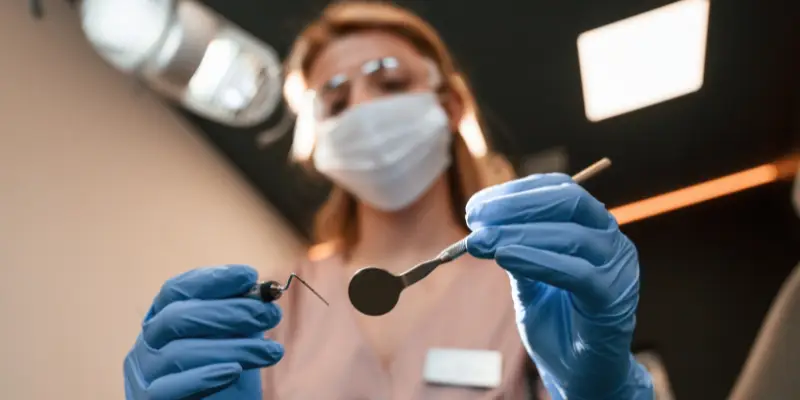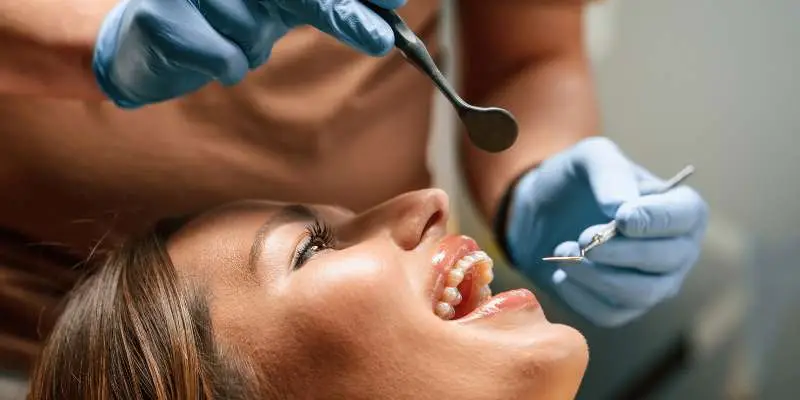Seeking periodontal treatment in Chelmsford? It’s a step many take towards improving their oral health.
Periodontal disease, commonly known as gum disease, affects a significant portion of the population, yet its early signs often go unnoticed.
Globally, 1 in 5 of us suffer from it according to a WHO report
This guide aims to shed light on the importance of periodontal health, the treatments available in Chelmsford, and how these interventions can transform your dental well-being.
Understanding Periodontal Disease
Periodontal disease is more than just an oral health issue; it’s a condition that can significantly impact one’s overall health. The initial stage, known as gingivitis, can evolve into periodontitis, a more severe form that can lead to tooth loss and other serious health complications.
Recognising the early signs of periodontal disease is crucial for prevention and early treatment. Symptoms often include swollen, red gums, bleeding during brushing or flossing, and persistent bad breath.
Causes of Periodontal Disease
Periodontal disease is primarily caused by the buildup of plaque, a sticky film of bacteria that forms on the teeth. If not adequately removed, plaque can harden into tartar, exacerbating gum inflammation and leading to the progression of the disease.
Other contributing factors include smoking, diabetes, hormonal changes in women, medications that reduce saliva flow, and genetic susceptibility.
Impact on Overall Health
Emerging research suggests a link between periodontal disease and systemic health issues such as cardiovascular disease, diabetes, and even Alzheimer’s disease. The inflammation associated with periodontal disease may play a role in these conditions, highlighting the importance of maintaining good oral health.
Treatment Options in Chelmsford
Fortunately, if you’re based in Chelmsford there’s a range of periodontal treatment options tailored to the severity of the condition and the specific needs of the patient. From non-surgical therapies to advanced surgical procedures, the goal is to control the infection and, if possible, restore any damage caused by the disease.
Non-Surgical Treatments
Scaling and root planing (also referred to as “PMPR“) is a common non-surgical treatment that involves deep cleaning below the gumline to remove plaque and tartar. This procedure can be effective in halting the progression of periodontal disease when detected early.
Another option is the use of antimicrobial mouthwashes and local antibiotic treatments that target the bacteria causing the infection.
Non-surgical treatments are often the first line of defense against periodontal disease. They are minimally invasive and can effectively manage the early stages of the condition. Patients undergoing these treatments may experience improvements in gum health and a reduction in symptoms such as bleeding and inflammation.
Surgical Treatments
For more advanced cases, surgical interventions may be necessary. Flap surgery, for instance, involves lifting the gums to remove tartar deposits in deep pockets. The gums are then sutured back in place to fit snugly around the tooth.
Bone and tissue grafts are another surgical option aimed at regenerating any bone or gum tissue lost to periodontal disease.
Surgical treatments are typically reserved for cases where non-surgical methods have not been successful or when the disease has progressed significantly. While more invasive, these procedures can be highly effective in treating advanced periodontal disease and preventing further damage to the teeth and gums.
Prevention and Maintenance
Preventing periodontal disease is preferable to treating it. Regular dental check-ups, proper oral hygiene practices, and quitting smoking are key strategies in preventing the onset and progression of the disease.
Regular Dental Visits
Regular visits to a dentist or periodontist in Chelmsford can help catch signs of periodontal disease early when it is most treatable. Professional cleanings are also essential in removing plaque and tartar that regular brushing and flossing might miss.
During dental visits, your healthcare provider will assess the health of your gums, check for signs of inflammation or infection, and recommend appropriate treatments if necessary. These routine appointments play a crucial role in maintaining good oral health and preventing the development of periodontal disease.
At-Home Care
Maintaining a rigorous oral hygiene routine is crucial. This includes brushing twice a day, flossing daily, and using an antimicrobial mouthwash to reduce bacteria in the mouth.
At-home care is a vital component of periodontal disease prevention. By following a consistent oral hygiene routine and making healthy lifestyle choices, individuals can reduce their risk of developing gum disease and maintain optimal oral health. Your dentist or periodontist can provide guidance on the best practices for at-home care based on your specific needs.
How it all comes together
I recall a patient at Danbury Dental Care, Sarah, who came to our clinic with advanced periodontal disease.
She was experiencing significant discomfort and was at risk of losing several teeth.
Through a combination of non-surgical treatments and instructions on oral hygiene habits, we were able to control the infection and save her teeth. Sarah’s journey is a testament to the importance of early intervention and the effectiveness of the treatments available in Chelmsford.
Conclusion
Periodontal disease is a prevalent condition that can have far-reaching effects on one’s oral and overall health.
However, with the right treatment and preventive measures, it is possible to manage and even reverse the effects of the disease. If you’re in Chelmsford and concerned about your periodontal health, consult a periodontist to explore your treatment options and embark on a journey to better oral health.
Don’t let periodontal issues compromise your smile and overall health.
At Danbury Dental Care, we’re committed to providing you with the personalised periodontal & gum care you need. Take the first step towards a healthier mouth by booking an initial consultation with us. We’ll conduct thorough X-rays, develop a tailored treatment plan, and guide you through prioritising the necessary treatments. Book An Appointment now and secure your path to optimal dental health.







